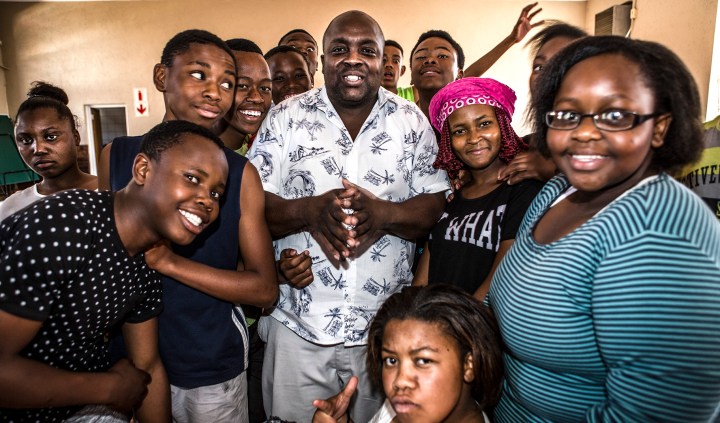WRITING HOME(LESS)
Doing something with nothing: Life on the margins during a pandemic

Covid-19 continues to wreak havoc in the lives of millions. We read about the economic meltdown and swelling ranks of the jobless, and that it is the poor and marginalised, the unemployed and homeless, who are bearing the brunt. But what is it really like for those living on the margins – the homeless and unemployed?
Harriet Perlman approached Tshabalira Lebakeng from the Homeless Writer’s Project to tell his story, but discovered that being homeless makes writing a mission in itself.
Harriet Perlman:
Getting from here to there; trying to inch your life forward little by little. Making anything happen when you have nothing – is always blisteringly hard!
You have the chance to tell it like it is. Hopefully earn a little money too. But your old second-hand computer crashes. Again. So you write things down in an old-school notebook. You say you will take the computer to a guy in Diepkloof when you can borrow some money for a taxi. The deadline comes and goes.
The editor suggests “start by sending voice notes on WhatsApp”. But you have no data, so you borrow a couple of rand for that. But you are fast running out of friends before it’s payback.
At night there is no electricity because the cables in your area have been stolen. So you write by candlelight. It’s tiring and hard because you haven’t eaten all day. You feel bad to just take food out the fridge because you don’t contribute anything.
On the day of the new deadline you borrow money to take a taxi to the mall, which costs R15, and see if the computer guy can help. He says he can “but it will cost you R100”, so you borrow that too.
“Why bother at all?” you say. “No one is free in the city. We are all paying someone back.”
If they publish your story you will earn some money. But you will also get a call (probably two or three) from a long-lost relative whose name you can’t remember. “Borrow me money,” he’ll say. “You’re in the newspaper. You’re famous! Unama millions.”
You borrow more money to use the internet café. Finally. Email.
Send.
Tshaba’s story:
My name is Tshabalira Lebakeng. I’m 42 years old. I live in Diepkloof Zone 4 in my aunt’s house. We are six people staying in a small house, including two babies. The house is small, I don’t have any privacy. Sometimes my stuff is missing. My watch it’s missing and my roll-on and socks. But I don’t ask anyone because I don’t like fighting and I don’t have a job. Only my aunt has a job, working in town in a complaints office.
As the man of the house I should be the one providing. It pains me. An old woman working for me? I feel like I am not a man. When you see there is no mielie meal in the tin and you can’t contribute to buy more, you always sleep with a broken heart. Me. I eat and sleep every day. What type of man am I?
My aunt, she is old and when she dies, if I still don’t have a job, maybe her kids will kick me out the house.
But I know the streets.
I have lived there before.
At the age of 12 my mother kicked me out. We lived in a backyard room. One day I arrived home and there was a stranger in the small bed my mom and I shared. Amos was a drunk and my mom just liked him more than me.
So at the age of 12 I found myself on the streets of Durban, where I lived with other street boys for the next six years. In 2011, I came to Jozi and eventually I found my rescue. I got my matric and my aunt invited me to stay in her small three-roomed house.
But I have been unemployed for 12 years now. I have lived on occasional work and handouts from my friends. I run a theatre group, Ngizwe, for children in Diepkloof, with my friend Emma, but it’s hard to get money and since Covid we haven’t met at all.
It is a terrible feeling when you’re unemployed and not contributing food in the house. You feel like the unused tool in a busy workshop.
Because I am unemployed I don’t have a say in the house. My girlfriend of three years left me this year. Because I have nothing I couldn’t afford to visit her. I couldn’t afford to take her out to a restaurant to eat nicely with a fork and knife or buy her pretty shoes on Valentine’s Day.

From the age of 12, Tshabalira Lebakeng lived on the streets of Durban for six years. He slept in concrete pipes near the train station. ‘At night I would sleep like a dead chicken and dream I was in a big fancy room and then wake up and bump my head on the pipe above me,’ he remembers. (Photo: Mark Lewis)
And now with lockdown I feel especially trapped. Trapped inside a prison with all of us in this small house. It feels like the end of my future. On social media they say many people are dying. I have diabetes and they say I must be especially scared. And during lockdown in the house everyone was stressed. We argued a lot and there was nowhere to escape. We argued about how to save food and try to get jobs.
We watched TV a lot. I like to watch cooking shows, like Braai Master. My cousins like to watch Generations and Uzalo. But we only have one television set. They tell me I don’t contribute to the house so “ungazenzi umaqhuzu weTV” (“you can’t be the controlling ass for the TV”).
So every day is the same. I wake up and try to gym a little. I eat some breakfast and clean the yard, then sleep some more and watch television.
But during lockdown when I was locked inside my house, out on the streets of Diepkloof it was like there was no lockdown at all. Everyone was outside. Kids were playing in the streets. They had loudspeakers and the sound of gqom and kwaito blared into the house. Car washes were open and old people sat drinking illegal alcohol and cigarettes on the sidewalk in street restaurants. And when the cops came they ran like hell.
Nyaope boys would stand next to tuckshops smoking drags with the police parked nearby. “Malume awungifakela nomayini kuyanyiwa malume impilo is’korokoro,” they would ask the shop owners (“Uncle, give me anything, life is shit, please uncle”).
One day I was sitting outside drinking a hot tea when Zakes and Mdu (not their real names) came to me and told me they need comrades for a “clean job”. I asked them what is a clean job? They told me it is a house in Zone 5. The owners went home to the villages since lockdown. So there is no one there and they have good stuff. Two TVs and other things. They said they thought of me because they know I’m unemployed and I’m their friend.
I said no but they said they will be back with something that will motivate me.
The following morning there was a knock at the door. When I opened the door it is Mdu smiling with a large TV in his hands. He said I can sell this TV and get money for bread. It’s for me. I went back into the house to fetch my garden fork. When I came back he runs away because he knows I don’t take shit.
Till today we don’t talk to each other. In my street they call me stupid because I don’t work with the boys. They say I don’t belong in ekasi if I am not in a crew, part of a housebreaking team. You are a stupid if you want to work for clean money.
In December last year I decided to go to the Eastern Cape for a few weeks. My friend lent me money to get out of Johannesburg for a while. I also wanted to see my grandmother who is 92 years old.
I am originally from Matatiele, a small town in the Eastern Cape, a village called Thabachicha. It’s a big village where amaXhosa, amaHlubi and baSotho people live. There are also lots of horses, cows and sheep and every house has a dog with a name like “Verwoerd” or “Hendrik”.
I got in a bus and headed out of town. When the bus moved out, everyone took off their masks. One old man said to me: “Corona only kills cats, dogs and donkeys.” A drunk lady told me I looked strong like an ox and asked me to marry her. She said: “You can pay one cow for me.”
When I arrived in Matatiele I noticed how many men there were in the village. One guy approached me: “You too are back. You will be a house broom and go to funerals so you can have a plate of food and brown beer. Welcome home, boy.”
Soon I was the subject of gossip too. They said I had lost my job because I had got drunk. I once had a small part on a television show so people think I must be rich in the city. If you a TV star you must have a car or a one-room house and a wife. Another neighbour said to my face: “You, Tshabalira, have no money because you ‘doing the blessing of ladies’ in Jozi.”
I visited Mr Lehlohonolo who was already back from Jozi. He is well known in the village for having many beautiful cows. But he lost his job and had to sell them to pay varsity fees for his three kids. People were laughing at him. They said he was behaving like a white man. He should rather send his kids to go work in the kitchens or in supermarkets in town.
One day I would like to have a food cart and be a writer. I would sell chicken and mutton liver and green stuff to keep healthy. My food would have funny names like “isitambu nobhontshisi” (“cowboys and crooks” – beans and samp) and “ulamthuthu nesobho” (“here come the cops” – chicken and gravy).
Before lockdown I started a project called the Ngizwe (hear me) Youth Theatre in Noordgesig, Soweto, for children from poor homes, which I ran with Emma. Parents go to work and when kids come back from school, they have nothing to do but play in the streets where they find trouble. But Ngizwe struggles for money and since lockdown we have shut down. I want kids to have a chance to be kids and play again.
Being a writer, having my theatre group for local kids and running my own spaza kitchen. That’s my dream one day.
Maybe I am crazy but I still want to believe that one day I will get a proper job. DM/MC
Harriet Perlman has worked in the field of entertainment and education, in film, television and publishing for more than 30 years. She has spearheaded numerous award-winning entertainment and education projects. She has experience as a writer for film and television, book editor, film producer, publisher and researcher. Harriet was a co-creator on Yizo YIzo and a producer at Soul City. She has worked on numerous communication and social justice campaigns including for Corruption Watch and Heartlines,. She co-produced and co-wrote a feature film called Vaya, with Rififi Pictures and edited the accompanying book, Vaya – untold stories of Johannesburg. Vaya was based on the lives of people in the Homeless Writers project which Harriet has run for the past 8 years. More recently she co-wrote and co-produced a documentary and book on black winemakers in South Africa. The Colour of Wine focused primarily on black women winemakers.




















 Become an Insider
Become an Insider
Comments - Please login in order to comment.